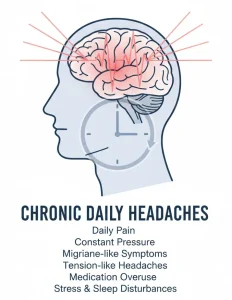Overview
Diagnosis
Your doctor will begin by examining you for signs of illness, infection, or neurological problems and will ask detailed questions about your headache history.
If the cause of your headaches remains unclear, imaging tests such as a CT scan or MRI may be recommended to identify possible underlying conditions.
Treatment
When headaches are caused by another medical condition, treating that condition often helps stop frequent headaches. If no underlying cause is found, treatment focuses on preventing pain and reducing headache frequency.
Prevention strategies depend on the type of headache and whether overuse of pain medication is a contributing factor. If you are taking pain relievers more than three times a week, your doctor may recommend tapering off these medicines before starting preventive therapy.
Once preventive treatment is considered, your doctor may suggest one or more of the following options:
Antidepressants
Tricyclic antidepressants such as nortriptyline (Pamelor) are often prescribed to treat chronic headaches. These medications may also help manage related symptoms like depression, anxiety, or sleep disturbances. Other antidepressants, including selective serotonin reuptake inhibitors (SSRIs) such as fluoxetine (Prozac, Sarafem), may help treat depression or anxiety but have not been shown to be more effective than placebo in preventing headaches.
Beta Blockers
Drugs used to manage high blood pressure, such as atenolol (Tenormin), metoprolol (Lopressor, Toprol-XL), and propranolol (Inderal, Innopran XL), are commonly used to prevent episodic migraines and may also help reduce chronic daily headaches.
Anti-Seizure Medications
Certain anti-seizure drugs, including topiramate (Topamax, Qudexy XR), divalproex sodium (Depakote), and gabapentin (Neurontin, Gralise), may help prevent chronic headaches and migraines.
Nonsteroidal Anti-Inflammatory Drugs (NSAIDs)
Prescription NSAIDs such as naproxen sodium (Anaprox, Naprelan) can be helpful, especially during withdrawal from other pain relievers. These medicines may also be used occasionally when headaches become more severe.
Botulinum Toxin Injections
OnabotulinumtoxinA (Botox) injections can relieve symptoms in some people who do not respond well to daily preventive medicines. This treatment may be recommended for those whose chronic headaches share features of chronic migraine.
Your doctor may begin with one medication, but if results are limited, a combination of treatments may be considered.
Advertisement

